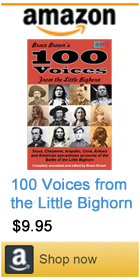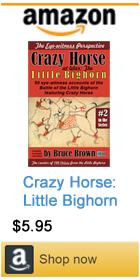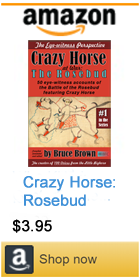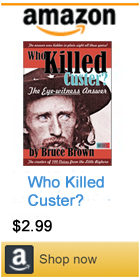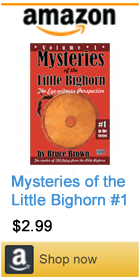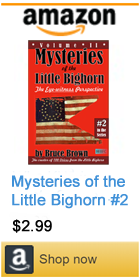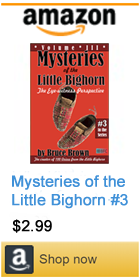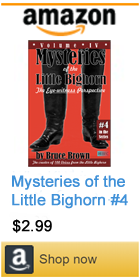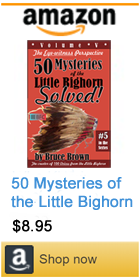|
||||||||||||
Bruce Brown's 100 Voices... He Dog Remembers Crazy Horse #3
HE DOG REMEMBERS CRAZY HORSE #3
A: This was at the time when Crazy Horse was camped a few miles from Fort Robinson and orders came for everybody to go over and camp beside the White (Crawford) Butte because they were going to hold a big council there. Everybody did so except Crazy Horse. Those in his camp who wanted to go to the council were told to move across the creek. I got up in council, and I said, "All who love their wife and children, let them come across the creek with me. All who want their wife and children to be killed by the soldiers, let them stay where they are." Afterwards Crazy Horse asked me and Iron Hawk to come to his tipi. We did. He was leaning back on a pile of blankets and cushions, and he reached under it and pulled out a knife and two cigars. He said this was a present brought him by two visiting white men who had come to see him that afternoon. He did not like the way they shook hands with him, and he did not like their talk, and he did not like their gift. He thought the gift of the knife meant trouble was coming. He thought they shook hands with him as if they did not mean him any good. He was afraid there would be trouble at that council. One of these white men was the soldier chief from Fort Laramie (Gen. [Lt. Col. Luther Prentice] Bradley); the other was D. H. Russell(?). I said, "Does this mean that you will be my enemy if I move across the creek?" Crazy Horse laughed in my face. He said, "I am no white man! They are the only people that make rules for other people, that say, `If you stay on one side of this line, it is peace, but if you go on the other side I will kill you all.' I don't hold with deadlines. There is plenty of room; camp where you please." After that White Hat [Lt. Philo Clark] sent for me and told me about these white men and wanted me to get Crazy Horse to talk to them some more. They sent over presents of food, and I made a big feast and invited the white men and sent a messenger to Crazy Horse. But he wouldn't come. He sent back word, "Tell my friend that I thank him and I am grateful, but some people over there have said too much. I don't want to talk to them any more. No good would come of it." I did not think he was really angry, but he had taken offense. They did not approach him right. He did not say whether he would or would not go to Washington. Q: Yugata (Frank Grouard) says in his book that he listened outside Crazy Horse's tent and heard Crazy Horse plot to bring his men to that council at the White Butte -- or else to an earlier council -- with weapons hidden under their blankets. When Crazy Horse shook hands with the white officer, his men were to draw their weapons and kill all the white people present, according to this story. We wondered whether perhaps Yugata might have been watching from outside when Crazy Horse pulled out the knife the white officers had given him and explained about the queer way they shook hands with him and got his idea about the plot from that. A: It was Long Chin, Lone Bear, and Woman Dress who spied around Crazy Horse's tent and told the white people those stories about him. I never heard until now that Yugata was in it. But I don't know. He may have planned the whole thing for all I know. Stories like that are what caused ill feeling. But I don't believe they were true. If I heard Crazy Horse say it once, I heard him say it many times: "I came here for peace. No matter if my own relatives pointed a gun at my head and ordered me to change that word I would not change it." When we first came down to the agency, Crazy Horse was willing to go to Washington. He said to me, "First, I want them to place my agency on Beaver Creek west of the Black Hills. Then I will go to Washington -- for your benefit, for my benefit, and for the benefit of all of us. And that is the only reason why I will go there." Spotted Crow and others told him, "That about going to Washington is only a decoy. They want to get you away from us, and then they will have you in their power." After a while Crazy Horse got so he thought it might be true. At last he told the officers, "I am not going there. I wanted to go, but you have changed my mind. Still deep in my heart I hold that place on Beaver Creek where I want my agency. You have my horses and my guns. I have only my tent and my will. You got me to come here, and you can keep me here by force if you choose, but you cannot make me go anywhere that I refuse to go." The Nebraska Indian Wars Reader edited by R. Eli Paul, University of Nebraska Press, Lincoln, NE 1998, p 194 - 196
A long-time friend, commrade-in-arms and ally of Crazy Horse's, He Dog was Short Bull's brother and Amos Bad Heart Bull's uncle. Here is one of He Dog 's accounts of the Battle of the Little Bighorn. He Dog surrendered with Crazy Horse at Ft. Robinson, NE, on May 6, 1877, along with White Twin, mentioned above. For more information on Crazy Horse's surrender, please see the Crazy Horse Surrender Register.
|
||||||||||||



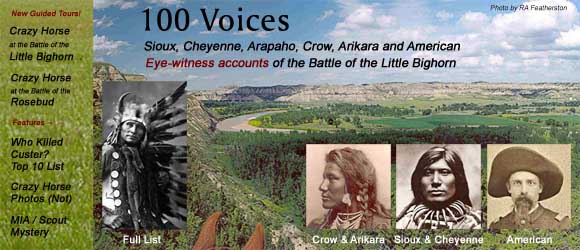
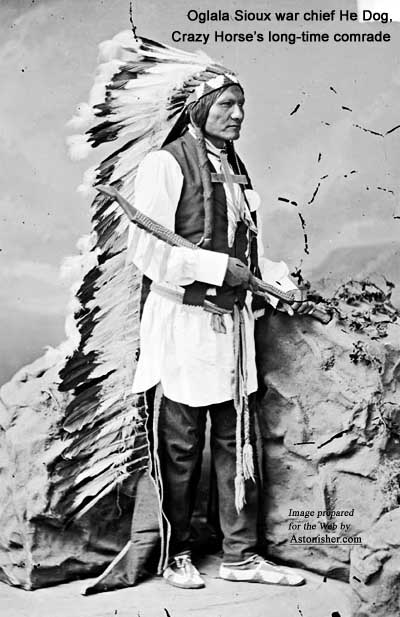 Q: The first time we came to see you, you started to tell us something about one time when two white men came to visit
Q: The first time we came to see you, you started to tell us something about one time when two white men came to visit 